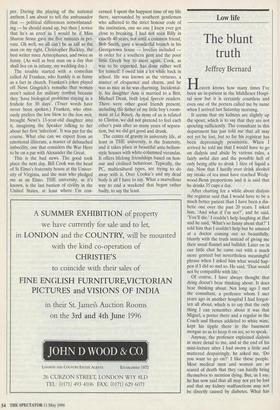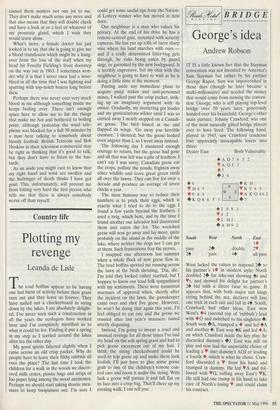Low life
The blunt truth
Jeffrey Bernard
Heaven knows how many times I've been an in-patient in the Middlesex Hospi- tal now but it is certainly countless and even one of the porters called me by name when I arrived last Saturday morning.
It seems that my kidneys are slightly up the spout, which is to say that they are not spouting sufficiently. The consultant in this department has just told me that all may not yet be lost, but so far his registrar has been depressingly pessimistic. When I arrived he told me that I would have to go on dialysis and abide by various rules, a fairly awful diet and the possible hell of only being able to drink 1 litre of liquid a day. Now that I hardly ever drink alcohol my intake of tea must have reached Wedg- wood-Benn proportions and it is said that he drinks 35 cups a day.
After chatting for a while about dialysis the registrar said that I would have to be a much better patient than I have been a dia- betic one over the past 20 years. I asked him, 'And what if I'm not?', and he said, `You'll die.' I couldn't help laughing at that and he said, `What's so funny about that?' I told him that I couldn't help but be amused at a doctor coming out so beautifully, bluntly with the truth instead of giving me their usual flannel and bullshit. Later on in our little chat he came out with a much more genteel but nevertheless meaningful phrase when I asked him what would hap- pen if I did so and so. He said, `That would not be compatible with life.'
Of course, I have always thought that dying doesn't bear thinking about. It does bear thinking about. Not long ago I met the consultant, a professor whom I met years ago in another hospital I had forgot- ten all about, which is to say that the only thing I can remember about it was that Miguel, a porter there and a regular in the Coach and Horses addicted to white wine, kept his tipple there in the basement morgue so as to keep it on ice, so to speak.
Anyway, the professor explained dialysis id more detail to me, and at the end of his mini-lecture after I had sworn a little and muttered despairingly, he asked me, `Do you want to go on?' I like these people. Most medical men and women are so scared of death that they can hardly bring themselves to mention dying. But, as I say, he has now said that all may not yet be lost and that my kidney malfunctions may not be directly caused by diabetes. What has caused them matters not one jot to me. They don't make much urine any more and that also means that they will double check and have a look at or a feel or whatever of my prostrate gland, which I wish they would leave alone.
What's more, a female doctor has just looked in to say that she is going to give me a blood transfusion which might be a hang- over from the loss of the stuff when my head hit Fenella Fielding's front doorstep on the way out in 1963. I sometimes won- der why it is that I never once had a nose- bleed in all the time that I was fighting and sparring with top-notch boxers long before then.
Perhaps there was never ever very much blood in me although something inside me keeps boiling over. There isn't enough space here to allow me to list the things that make me hot and bothered to boiling point, although yesterday the ward tele- phone was blocked for a full 30 minutes by a man here talking to somebody about bloody football. British Telecom and Bob Hoskins in their television commercial may be right in thinking that it's good to talk, but they don't have to listen to the bas- tards.
As an aside you might care to know that my right hand and wrist are swollen and the harbinger of death thinks I have got gout. This, unfortunately, will prevent me from hitting very hard the first person who tells me that there is always somebody worse off than myself. '



































































 Previous page
Previous page